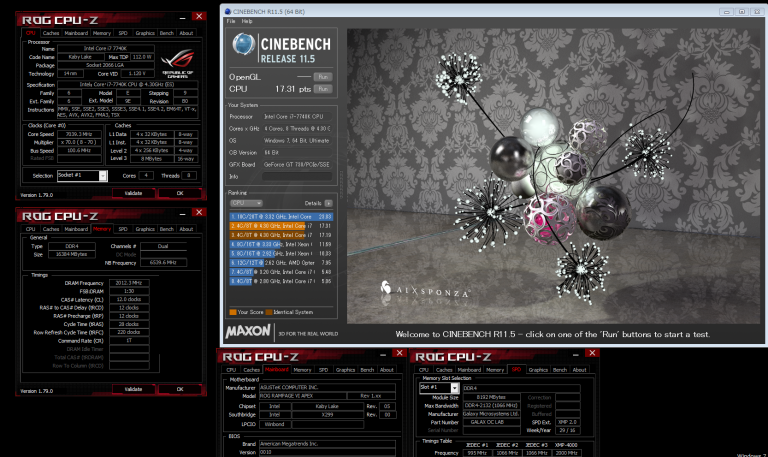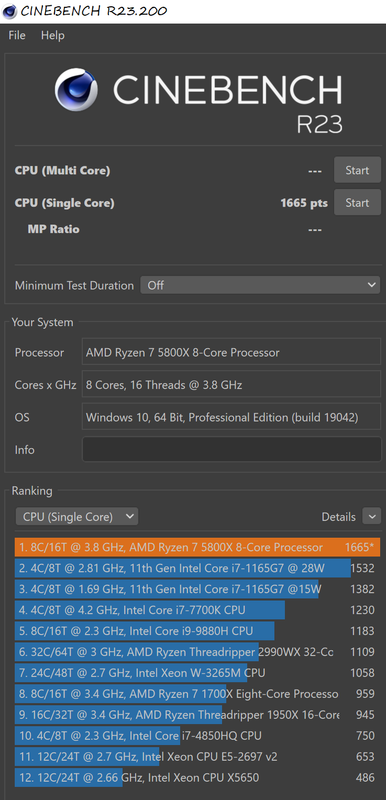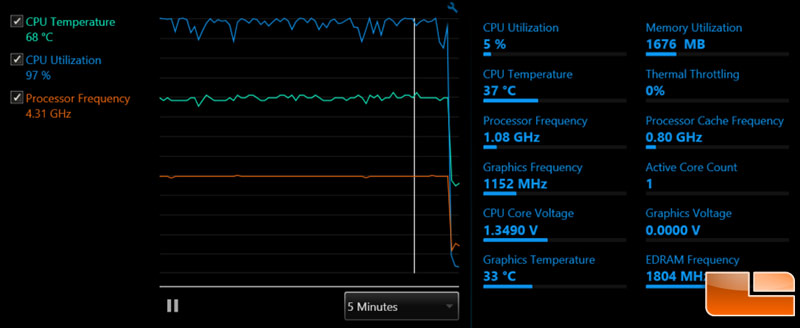
- #Cinebench not showing overclock manual
- #Cinebench not showing overclock Pc
- #Cinebench not showing overclock free
There is really not much you can do to increase the single or lightly threaded performance with typical overclocking methods. Typically I will run Cinebench single and multicore and monitor voltage and temps with either Ryzen Master or HWInfo.
#Cinebench not showing overclock free
So the default socket power limits are a little anemic for my setup, and it is free performance, which equals more work done faster. My machine is liquid cooled with a monoblock that also covers the VRMs. So it has to handle scientific workloads with Fourier transforms of large data sets etcetera.

It is a gaming rig and movie/music server, but it also doubles as a work machine.

Why do you overclock your CPU and/or GPU in the first place? So for me, my system is dual purpose.Im planning on upgrading to a 3xxx card whenever they come probably late this year. Almost 80-90 fps difference which is greatly beneficial for me. I am fully aware, I actually mainly play csgo and the difference between 4.6 and 4.9 does improve my fps because I play 1920x1440 lowest settings. it will have little to no impact in games the gpu is the limiting factor in your case so running your cpu at anything higher than stock is only going to benefit you in benchmark software. since you are only running a 590 gpu there is really no point in overclocking your cpu. I just run 4.9 now which I know is stable. I actually managed a few stable runs at 5 Ghz yet suddenly it would crash a few hours later when i ran cinebench or tried running timespy. I was actually hoping to hit 5.1 or 5.2 but I tried 1.38v and it still crashed so I guess I got unlucky with silicon lottery. After id dial down the oc and play at stock gpu and 4.9ghz cpu at like 1.34v.
#Cinebench not showing overclock Pc
Oprindeligt skrevet af rezo:Im not planning on using 5ghz I just want to push my cpu and benchmark my pc at its max capability to hit the highest firestrike score I can. LLC should always be set to a medium setting for the best results. The maximum voltage most people recommend for a long term OC is between 1.3 to 1.35, but the most common is 1.325v.
#Cinebench not showing overclock manual
Ryzen's still right on Intel's heels without a heavy manual OC. The "5 GHz+ trend" is not worth it if it takes you more than that, not like it's going to make a big difference anyway. It only gets worse over time, this is why silicon lottery binning statistics for newer Intel CPUs rarely list anything over 1.325v. Over time, you might find that it becomes unstable and have to raise the voltage slightly to fix that. To say that it won't affect lifespan whatsoever even in the extreme is a stupid claim you should never make, because all it takes is a bad LLC setting on top of an already high voltage for a CPU to get slammed with fatal voltage, which will at the very least damage the CPU's ability to maintain a decent OC at a decent voltage.įor example, you start running a 5.3 GHz OC on a 9900K, at 1.4 volts.

CPUs are very hardy in general.Įven if you overclock to the extreme, it will lasts easily 7-10 years, may be more.Īctually, higher voltages will wear down the CPU regardless, which means you'll have to increase voltage over time to maintain that frequency. Oprindeligt skrevet af ⎛⎝ Cloud Boy ⎠⎞:Forget about CPU lifespan. Silicon lottery is sorta like the human metabolism. but eventually you will hit a wall where the drug (voltage) required is just too much and you overdose (kill the cpu). maybe a year down the track you will need more voltage to get the same result and if you don't give it more it becomes unstable. the more you pump into it the more it will need over time to get the same result. think of a cpu as a junkie and it's drug of choice is voltage. According to hwmonitor, coretemp and aida64 it says its 1.3v max idk why there's no telling how long it would last. I dont have cooling issues nor do I think my cpu is actually running at that voltage despite me setting it to that on my bios. Why how long would a cpu last on average at 1.325v compared to 1.375. Your focus should be getting the highest stable clock you can get with 1.325v, because voltage above that isn't sustainable for a long-term OC that won't involve CPU lifespan degradation. Oprindeligt skrevet af Escorve:It's silicon lottery not all 9600Ks can do even 5 GHz at 1.325~1.35v.


 0 kommentar(er)
0 kommentar(er)
